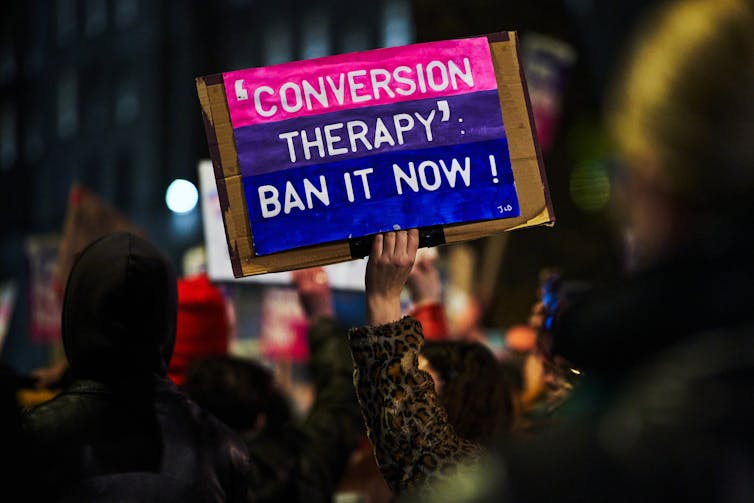
For the first time in four years, the king’s (or queen’s) speech has left out a promise to ban so-called “conversion therapy”. This widely discredited set of practices aims to “cure” LGBTQ+ people by changing or repressing their sexuality or gender identity.
The government first promised a ban in July 2018, but has stalled on introducing draft legislation. The director of external affairs at LGBTQ+ rights charity Stonewall called it an “act of frightful negligence” that the government has not yet banned the practice.
The king’s speech on November 7 did not mention the topic. But past proposals indicate that any forthcoming bill will come with one huge caveat: that people over 18 can give their informed “consent” to “conversion therapy”.
Such an exception, as campaigners have warned, would render the ban almost wholly ineffective. Many LGBTQ+ people consent to these practices even when they recognise them as harmful, due to social, familial or religious pressures. Typically, their consent is shaped by powerful influences in their social environment: they want to belong and feel “normal” within their religious or social communities.
The widely-used term “conversion therapy” is itself problematic. It suggests that a person’s sexuality or gender identity, or their expression of these identities, are a condition that can be cured or treated. Therapy also conveys the misleading idea that there is sound medical or scientific evidence backing conversion practices, as there is with legitimate therapies. These ideas are patently false: LGBTQ+ identities are not illnesses or pathologies, nor is there any evidence that they can be changed through “treatment”.
Why the consent loophole contradicts the law
To be valid in law, consent must be informed and voluntary. As the government’s consultation documents on conversion practices correctly note, this means that a person “must be given all of the information about what the therapy involves, including the short and longer term risks”.
So, informed consent in this context would require the “therapist” to tell the recipient that there is extensive scientific evidence that conversion practices can cause grave, lifelong physical or psychological harm. This evidence has come from the NHS, the World Psychiatric Association, the United Nations and the Council of Europe, to name just a few.

The recipient must also be told that there is incontrovertible evidence that “conversion therapy” does not work. This is another point that the government’s proposals expressly recognise. There is no debate, really, among experts on either of those two points.
So, to give their informed consent, recipients must be told that “conversion therapy” puts their health at grave risk and that it does not work. It is difficult to imagine a situation where a “therapist” would or could offer such information. In fact, most people interviewed in the government’s own research were not given accurate information about the risks, nor were they offered an alternative.
When consent isn’t voluntary
But here is the rub: even if a provider of “conversion therapy” did offer this information, evidence shows that many LGBTQ+ people would still consent to undergo such practices in order to avoid exclusion or rejection from their communities.
This takes us to the second requirement for informed consent: it must be voluntary. Voluntary here means that the decision to consent must be made by the person, and not be influenced by others.
However, truly voluntary consent is not possible here. “Conversion therapy” takes place in a context of historical stigmatisation of LGBTQ+ people, and always involves a strikingly asymmetrical power relationship. Both those points are important. As a 2020 UN report puts it, “conversion therapy” is a relationship between “enlightened” providers – typically religious authorities, counsellors and psychotherapists – and “benighted converts”.
In a study by the international LGBTQ+ human rights group OutRight, interviewees described enormous family and cultural pressure to undergo “conversion therapy”. As one participant described, this can go on for many years:
‘Conversion therapy’ is not a single event – it is a process of continued degradation and assault on the core of who you are. There are often repeated violations in the form of psychological and sometimes physical abuse … It is not one instance – it is a continued sense of rejection. The pressure is enormous.
Conversion practices are objectively humiliating for all LGBTQ+ people, even for those who never experience them themselves. These practices portray LGBTQ+ people as abnormal and disgusting, and their choices in the most intimate spheres of life as an appropriate subject for therapeutic intervention. “Conversion therapy” builds on longstanding stigma and shame felt by LGBTQ+ people, who repeatedly hear (and may internalise) the message that their sexuality or gender identity is inferior to others’, and that it can and should be cured.
‘Conversion therapy’ and coercive control
This combination of humiliation, social stigma and power imbalance places all forms of “conversion therapy” squarely within the definition of coercive controlling behaviour in UK law.
Coercive controlling behaviour includes acts of humiliation or intimidation that cause distress to a person. In a relationship of coercive control, perpetrators typically gaslight victims into blaming themselves for any abuse they suffer, or understanding the abuse to be beneficial to them.
Coercive controlling behaviour in the context of domestic abuse is illegal in the UK, regardless of whether someone consented to it. The same should be true of “conversion therapy”.
In terms of international law, the fact that conversion practices combine a proven risk of grave harm with direct discrimination against LGBTQ+ people means that they amount at least to degrading treatment. This is prohibited in international human rights law regardless of whether someone consented to it.
That is why the UN asked states in 2020 to “prohibit all practices of ‘conversion therapy’, including faith-based organisation counselling, by any person for any reason”. The UK must follow the many countries that have comprehensively banned “conversion therapy” without exceptions for individual consent.
Ilias Trispiotis does not work for, consult, own shares in or receive funding from any company or organization that would benefit from this article, and has disclosed no relevant affiliations beyond their academic appointment.
This article was originally published on The Conversation. Read the original article.







